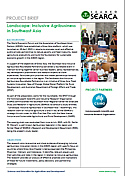Landscape: Inclusive Agribusiness in Southeast Asia
BACKGROUND
 The World Economic Forum and the Association of Southeast Asian Nations (ASEAN) have established a Grow Asia platform, which was launched on 19 April 2015 in Jakarta to promote novel and effective public-private partnerships to reduce poverty and food insecurity, boost agricultural productivity and build the foundations for sustainable economic growth in the ASEAN region.
The World Economic Forum and the Association of Southeast Asian Nations (ASEAN) have established a Grow Asia platform, which was launched on 19 April 2015 in Jakarta to promote novel and effective public-private partnerships to reduce poverty and food insecurity, boost agricultural productivity and build the foundations for sustainable economic growth in the ASEAN region.
In support of the objectives of Grow Asia, the Southeast Asia Inclusive Agribusiness Roundtable Partnership convened a roundtable event in Vietnam to bring together senior business leaders, policy representatives, key development practitioners and research experts to share experiences, formulate joint priorities and create partnerships towards an inclusive agribusiness in the region. The Southeast Asia Inclusive Agribusiness Roundtable Partnership is an initiative of Grow Asia, Food Systems Innovation, Seas of Change, Global Donor Platform for Rural Development, and Australian Department of Foreign Affairs and Trade (DFAT).
As part of the preparatory works for the roundtable, the DFAT through the Commonwealth Scientific and Industrial Research Organisation (CSIRO) commissioned the Southeast Asian Regional Center for Graduate Study and Research in Agriculture (SEARCA) to conduct a study entitled, “Landscape: Inclusive Agribusiness in Southeast Asia.” Accordingly, this research work on inclusive agriculture is also in lieu of the SEARCA’s strategic thrusts under its 10th Five-Year Plan with the focal theme Inclusive and Sustainable Agricultural and Rural Development (ISARD).
The scoping study was conducted from June to July 2015, with Dr. Nerlie M. Manalili, a well-known Agribusiness Specialist in the region and former Head of SEARCA’s Research and Development Department (RDD), being the project’s study leader.
OBJECTIVES
The research aims to examine and share evidence of emerging inclusive agribusiness innovation trends in the ASEAN region with specific focus on countries where Grow Asia Chapter is being organized (the Philippines, Myanmar, Vietnam, and Indonesia). It identifies relevant players and their activities and roles in the region in relation to inclusive agribusiness. The research provides an analysis of effective practices and implications of these for future investments, policy decisions, and partnership strategies.
METHODOLOGY
The study provided an assessment and mapping of relevant players and their activities and roles in the region with specific attention to Vietnam, Indonesia, the Philippines, and Myanmar. A desk study of secondary sources and expert knowledge was used to evaluate agribusiness innovation trends and highlight key champions and practices in the ASEAN region. Specifically, the study addressed the following questions:
- What are the critical private sector, research and civil society organizations and associated support networks engaged with agribusiness in ASEAN?
- What is the role of these organisations and what are their strengths and weaknesses with respect to advancing an inclusive agribusiness agenda in the region?
- A list a key resource documents, websites and contacts.
OUTCOMES
The results of the scoping study were presented during the Roundtable on Inclusive Agribusiness in Southeast Asia that took place in Pullman Hotel, Ho Chi Minh City on 23-25 September 2015. The roundtable, which aims to provide a venue for sharing and exploring approaches and solutions to challenges of inclusive agribusiness in Southeast Asia, has successfully gathered more than 100 key practitioners in the field of agribusiness consisting of private sectors, farmer’s group, government, academe, civil society/NGOs, and international/ regional development organizations.
SEARCA, through Dr. Manalili, presented the results of the scoping study on the landscape of inclusive agribusiness in Southeast Asia with emphasis on the status, trends, functions, shape, and factors supporting success of inclusive agribusiness in the countries of Indonesia, the Philippines, Myanmar, and Vietnam. Furthermore, SEARCA shared the session on “Comparing Country Context” with Dr. Paul Teng of the Nanyang Technological University who introduced a framework for analyzing the enablers of inclusive agribusiness which come in multiple dimensions and at different scales. These two presentations set the stage for the subsequent concurrent country sessions.
CONCLUSION
Inclusive agribusiness development requires a multifactor consideration the same way that it requires multi-sector involvement. The key is to be able to identify the interventions required: on what aspect of the value chain, when to be delivered and in what manner. This requires careful needs assessment involving the stakeholders themselves in an empowered and informed decision process. Likewise, it needs to be undertaken in an enabled environment, paved for by the public sector, supported by the programs of the private counterparts, the development institutions, civil society and farmer organization.
Related News:
- SEARCA supports inclusive agribusiness initiatives in Southeast Asia
- SEARCA undertakes scoping study on Inclusive Agribusiness in Southeast Asia for DFAT-CSIRO in support of Grow Asia Partnership